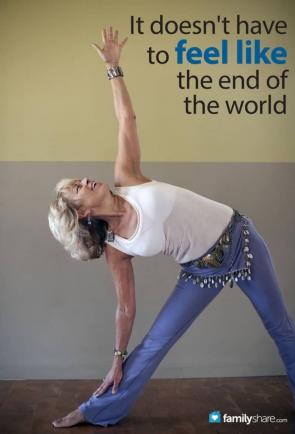
Perhaps you've had a similar one-sided conversation with your spouse at bedtime:
"Sweetie, it's so hot in here. Open a window, will ya?"�
"Freezing!! Close the window just a bit, OK?"
"Holy Mylanta! You give off more body heat than an elephant. Scoot over!"
"Did I ask you, yet, about closing that window?"
"Hot hot hot! What's up with the closed window?"
Remember that this "conversation" can take place within a 15-minute time frame and refers to only one charming side effect of menopause - hot flashes.
While menopause symptoms and their intensity differ from one woman to another, there is one common theme that every woman shares - menopause is one of those things in life that you can't go around you just have to go through. Doctors and specialists agree there is not much you can do to completely rid yourself of the symptoms, but there may be some things that can help lessen them.
What about traditional hormone replacement therapy?
Whether or not to consider HRT should be discussed with the woman's healthcare provider reviewing all the risks and benefits. Some of the pros of taking HRT are, a decreased risk of colon cancer and bone loss and, of course, a decrease in menopausal symptoms. The risks include, an increased chance of certain types of cancers, as well as high blood pressure, risk of strokes and blood clots. Some sources indicate the body may become dependent on synthetic hormones (such as, estrogen) and recommend herbal supplements that encourage the body to produce these hormones on its own.
What about nontraditional therapies?
While many of these methods are unproven and may be more or less effective depending on the woman and the method, many medical websites list them as having positive benefits for many patients. Some nontraditional therapies include meditation, relaxation techniques, as well as acupuncture. Herbal remedies may provide relief as well: black cohosh, dong quai, or ginseng. As always, consult with your doctor if you plan on taking any herbal medicines as some may counteract with current medicines or create other side effects.
Suggestions symptom by symptom
Hot flashes or night sweats
1. Avoid spicy food before bed. It is best to avoid any food at least 2 to 3 hours before retiring for the evening.
2. Wear light clothing or clothing with wicking properties.
3. Keep sleeping room temperature at 66-68 degrees Fahrenheit.
4. Keep ice water by the bed with a washcloth. Hold the washcloth to the wrist at the onset of a hot flash to reduce the duration.
5. Avoid hot baths before bed.
Weight gain
The days of shoving chili cheese fries in your mouth without worries are over. Weight gain can be controlled, but it will entail disciplined calorie counting and an increase in cardio. Many healthcare practitioners recommend Weight Watchers by name as a safe and effective weight loss and management program. There are many free apps that can keep track of calorie intake and expenditure. Try Lose It! or MyFitnessPal, both available for iPhones or Androids.
Declining sex drive
Many women complain of a loss of libido that can be caused by declining estrogen levels. After determining with your doctor that the decline is, indeed, due to menopause and not another underlying cause, the following remedies may help:
1. Localized estrogen therapy in the form of suppositories, creams or rings.
2. Vitamin E oil used locally to rehydrate tissue and possibly improve sensation.
Two over the counter products have been recommended by several medical websites including WebMD: Zestra and ArginMax, both available through their respective company websites or through Amazon. In the "Journal of Sex" and "Marital Therapy" of 2003 and 2001 respectively both were involved in studies and found to show statistically significant increases in desire and satisfaction.
Mood swings
Cardio is shown to improve moods and release endorphins. It helps with stress and anxiety promoting a general feeling of wellbeing. The Mayo Clinic website has a great article on the benefits of regular exercise.
Besides, going for a quick run is much better than coming up with an alibi when they find your husband buried in a shallow grave in the backyard. Many of the herbal therapies may help with mood swings, as well.
Yoga and meditation are ways a person can relieve and reduce the stress of menopause. Meditation offers great benefits for relieving all kinds of stress and is an effective relaxation technique. For guided meditation, there are some great ones available for MP3 players and on iTunes. Dr. Jon Kabat-Zin, a professor of Medicine Emeritus and founding director of the Stress Reduction Clinic and the Center for Mindfulness in Medicine, Health Care, and Society at the University of Massachusetts Medical School offers a great stress-reduction program through a series of CDs called Mindful Meditation. (These can be purchased at many places, but the link provided was the least expensive venue and has been personally used by the article's author.)
A study that appeared in the Oct. 30, 2011 issue of the journal "Menopause" indicated that doing Yoga two times a week helps to improve and relieve menopause symptoms. One recommendation is to take at least one class a week at a yoga studio (to ensure that one is performing the poses correctly) and then to engage in 15 minutes of yoga daily at home.
Menopause doesn't have to feel like the end of the world. With a correct diet, adequate exercise, and an open dialogue with your healthcare provider this transition can be a much smoother one.
Just make sure to sleep close to the window.

